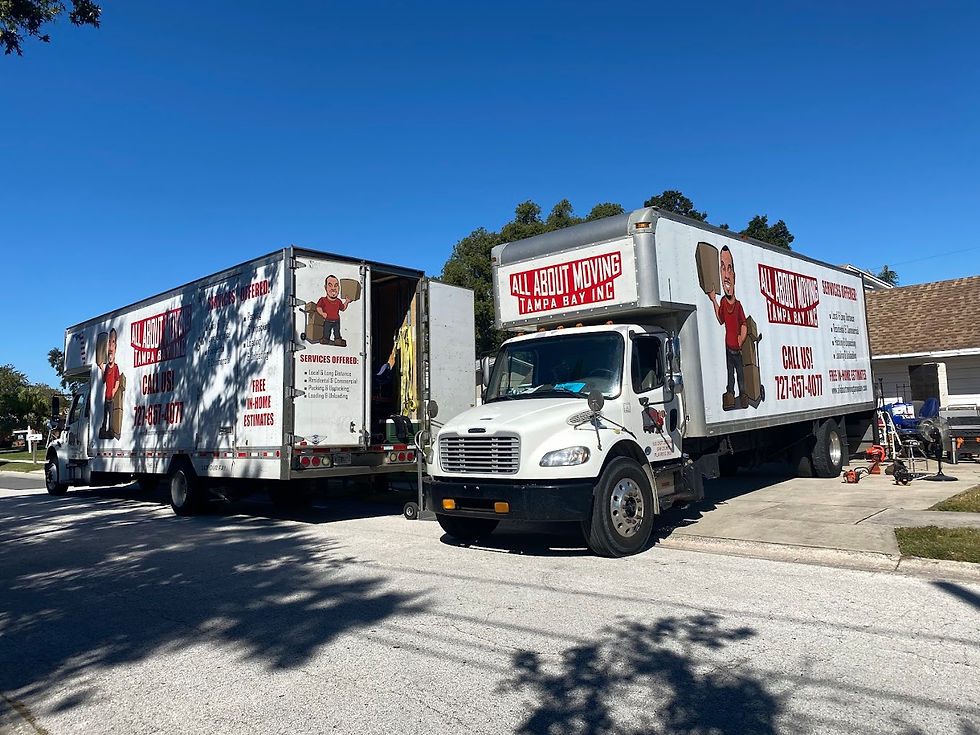How to Make Your Move Stress-Free and Efficient
- Melisia Diamond
- May 16, 2025
- 4 min read
Moving to a new home can be exciting, but it often comes with its fair share of stress and chaos. Whether you are moving across town or across the country, planning and organization are key to ensuring that your move is as smooth as possible. In this blog post, we'll provide practical tips and strategies for making your move not only efficient but also stress-free.
Tips for a Stress-Free Move
Start planning your move as early as possible. Ideally, you should begin the moving preparations at least two months in advance. This gives you ample time to sort through your belongings, declutter, and organize.
Create a Moving Checklist: A checklist can help guide you through the moving process. Write down essential tasks like packing, hiring movers, notifying utilities, and changing your address. Check off each task as you complete it.
Declutter Before Packing: Go through each room and decide what you truly need. Donate or sell items you no longer use. Not only will this lighten your load, but it will also save you time packing and unpacking later.
Get the Right Packing Materials: Invest in quality packing supplies such as sturdy boxes, bubble wrap, and packing tape. You can often find free boxes at local retailers or use containers you already have at home.

Choosing the Right Moving Company for a Stress-Free Move
Selecting the right moving company can make all the difference. Here are some steps to help you find a reliable mover:
Research Local Movers: Look for reputable moving companies in your area. Checking online reviews and asking friends for recommendations can help you narrow down your options.
Get Multiple Quotes: Don't settle on the first company you find. Obtain quotes from several movers to compare rates and services.
Check Credentials: Ensure that your chosen mover is licensed and insured. This provides peace of mind that your belongings are protected in case of damage during the move.
Read the Fine Print: Carefully read contracts and understand the terms before making a decision. Watch out for additional fees or unexpected charges.
If you’re interested in professional help, consider exploring various moving services for a hassle-free experience.

How much does a good move cost?
The cost of a move can vary significantly based on several factors, including distance, the size of your household, and the time of year. On average, moving locally can cost anywhere from $300 to $1,500, while long-distance moves can range from $2,000 to $5,000 or more.
Here are some elements that can influence the cost of your move:
Distance: The farther you move, the more you will generally pay. Long-distance moves often include additional charges based on mileage.
Size of Your Home: Larger homes require more labor and time, which can increase the overall moving cost.
Extra Services: If you have specialty items like pianos or fragile antiques, you may incur extra charges for their transportation.
Time of Year: Moving during busy times, such as summer, can also affect costs. Weekends and holidays typically see higher rates.

Packing Smart for an Efficient Move
Efficient packing can save you time and energy. Here are some tips to pack effectively:
Label Boxes: Clearly label each box with its contents and the room it belongs to. This will help you easily find essential items when you arrive at your new home.
Pack Room by Room: Focus on packing one room at a time. This method prevents you from feeling overwhelmed and keeps your efforts organized.
Use Space Wisely: Fill boxes to the brim, but don’t overload them. Use smaller boxes for heavier items and larger boxes for lighter items to avoid breaks.
Keep Essentials Accessible: Prepare a "first-night" box with essentials like toiletries, a change of clothes, and any necessary paperwork. This box will be a lifesaver as you get settled into your new space.
Settling Into Your New Home
Moving is just the beginning. Once you arrive, getting settled into your new home should be your next focus.
Unpack Strategically: Start by unpacking the essentials first. As you organize each room, consider how you want your space to function.
Explore Your Neighborhood: Take some time to explore your new area. Visit local shops, parks, and other attractions to help you feel more at home.
Connect with Neighbors: Building connections in your new community can make your move feel less isolating. Consider introducing yourself to your neighbors and attending local events.
Set Up Utilities: Ensure all utilities like electricity, water, and internet are set up and functioning. This will provide comfort as you settle in.
Create a Comfortable Environment: Add personal touches to your new home. Unpack pictures, books, and decor that reflect your style and make the space feel like yours.
Successfully navigating your move takes planning and preparation. By following these steps, you can turn a potentially stressful experience into a smooth transition to new beginnings. Remember, the key is to stay organized and ask for help when needed.
Final Thoughts on Making Your Move Stress-Free
Moving does not have to be a burdensome experience. With careful planning and organization, you can simplify the process and ensure a smooth relocation. Remember to keep communication open with your moving company and enlist help from friends or family when needed. Embrace the upcoming changes with optimism, and soon you will find yourself comfortably settled into your new home, ready to create new memories.




Comments